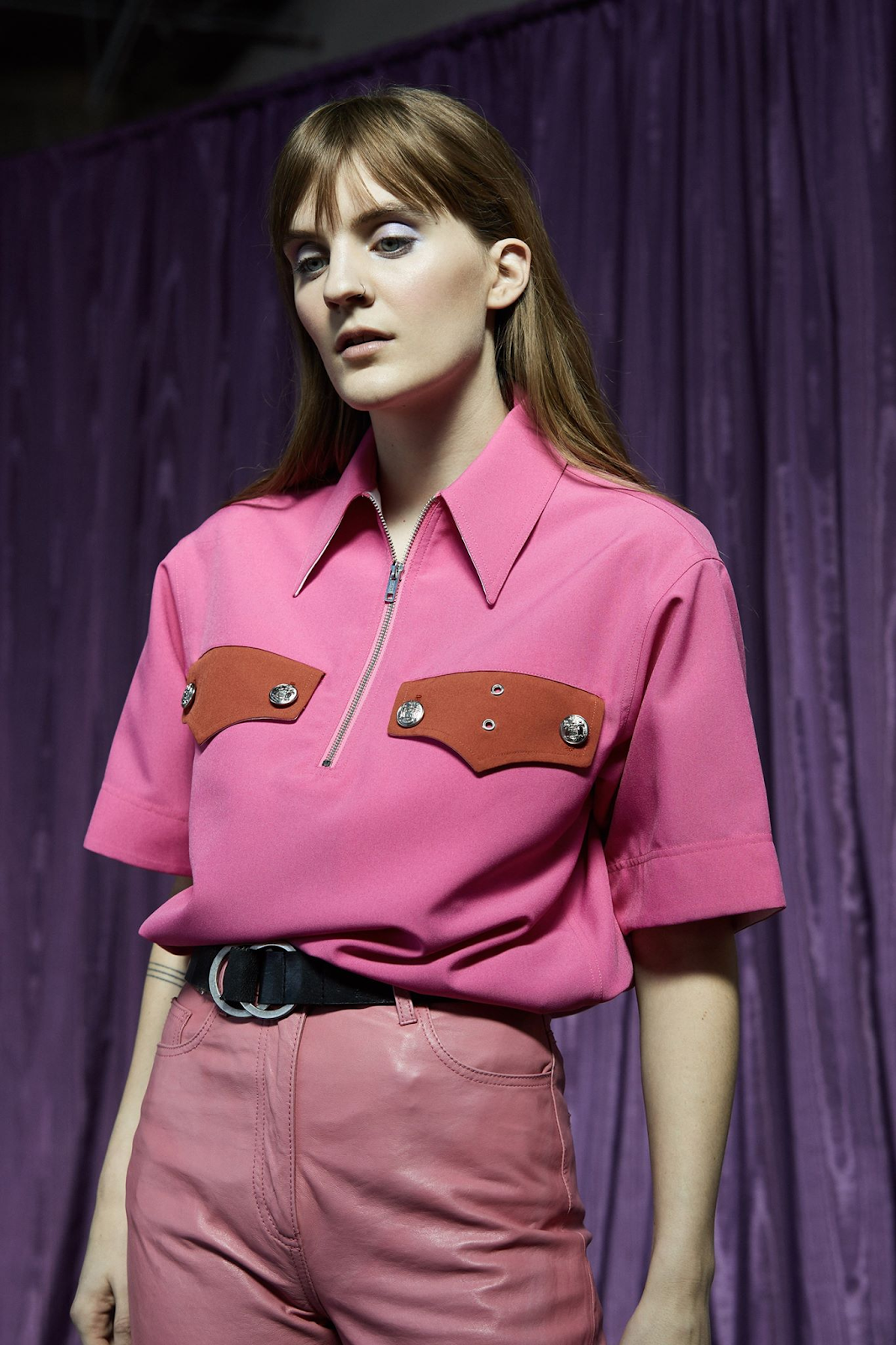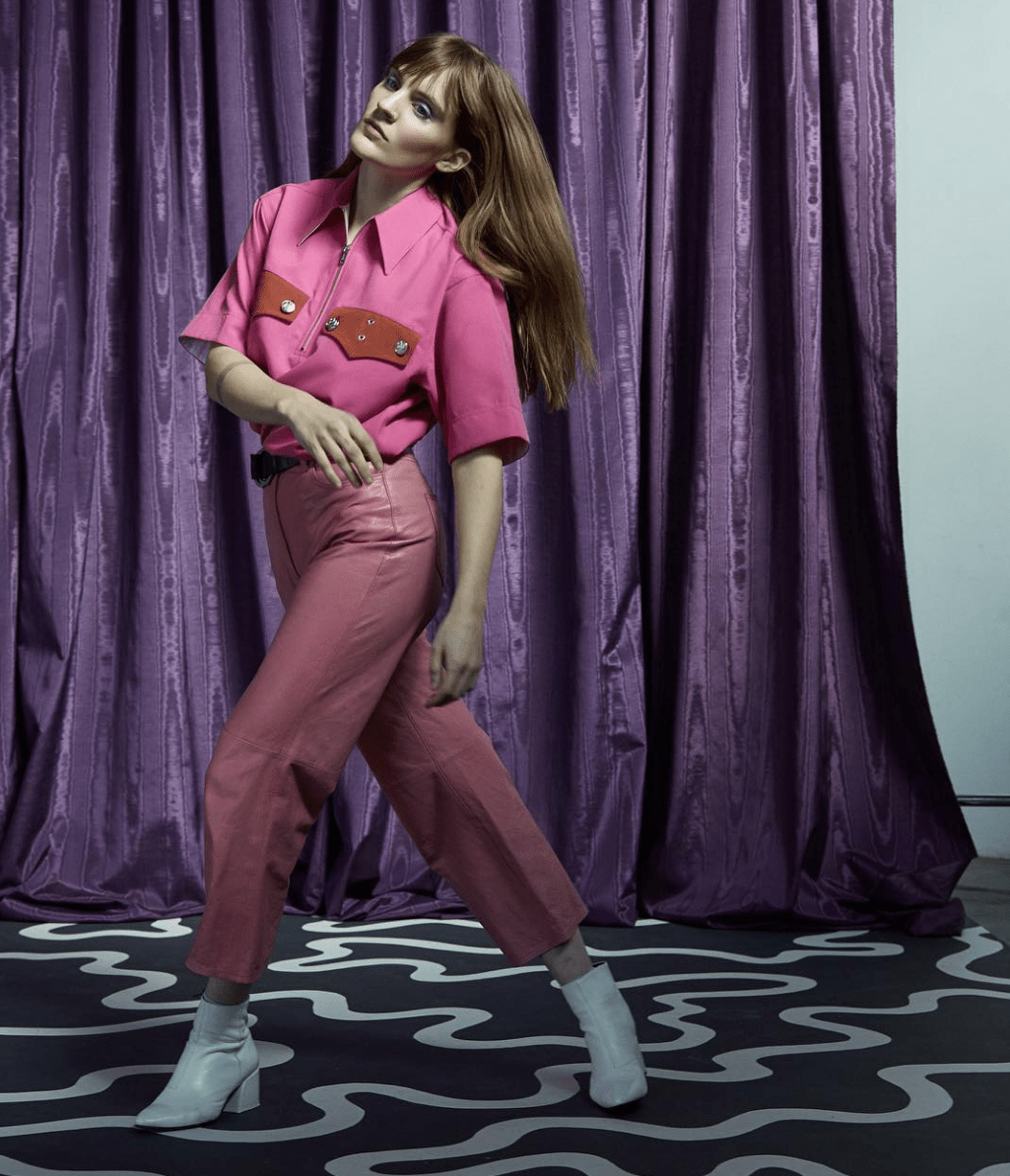24-year-old Georgia-born, Nashville-based musician Liza Anne explores her own psyche and the demons that live within it on her new album, Fine But Dying . Recorded at La Frette studios in Paris — where Nick Cave and Feist have previously laid down their creations — it’s an eleven track opus full of pop hooks and honesty. “I’m not crazy because I have obsessive thoughts and anxiety,” she tells i-D. “I’m just a human being who’s learning how to exist inside of my body with my mind. This record gave me permission and a lot of space, and I hope that it can do the same for other people too.”
Liza Anne’s third record, Fine But Dying came out a month ago on Canadian indie label Arts & Crafts and sparked an impressive series of events including a live television debut on Conan, her first London show and a tour that looks set to keep her busy for the best part of 2018. Her previous albums — The Colder Months (2014) and Two (2015) — were more acoustic-folk, which she cites as as a result of having then just about made it out of a very repressive religious environment. But now, having broken free of the restrictions of her youth, we’re seeing the musician embrace indie rock, and with it, the mainstream.
What’s been going on in your world and headspace since you released the album?
It’s been really wild because with this record I’m being very explicit about a lot of the stuff that I’ve been secretive about before, like my struggle with mental illness and anxieties, and discovering my divine feminine power. With this record I created a space for myself where I got to live and explore and experience myself fully. It’s amazing to have all of those things so public. I’ve felt so free and so powerful. But at the same time, I put so much of myself into the record, that I’m left wondering what part of myself is left just for me.
Was the process approached as a kind of therapy?
I knew that I needed to do that to heal myself. I knew that I needed to be very straightforward. But at the same time, I wish that as a 13 or 14-year-old I had known that I wasn’t crazy. I wish I could’ve had a door into that part of myself way earlier. So I’m kind of hoping that this record can act as a portal for people to go further into themselves, into more of their own power, and into realizing that they aren’t crazy, you know?
What’s it like making art about a person that you’re still in a relationship with?
There have been times when my writing has created these very real walls between my partner and I, and then there have been times that it has been the greatest lesson of empathy. For example, with I’m Tired, You’re Lonely and Paranoia, I’m writing from my side of it, but by the next week I’m on the other side and [my partner] is the one with that viewpoint. In relationships you usually end up playing every role over the course of your entire relationship. I feel like my writing has given me more of an understanding over us.

Your album is called Fine But Dying. Can you explain the duality of that feeling and how you’ve you come to balance it in your own life?
That phrase started to appear a lot in the way I would describe myself to people. One of my favorite quotes is from Albert Camus when he says, “and all things were merely in a way.” At any given moment, we can be a fragment of so many different emotions, and it’s pretty bizarre to imagine that we’re only one thing. I think I had just started to realise that humanity is a walking contradiction; I am all things at once, and at the same time nothing at all. Life is just a case of emotions walking around covered in flesh, trying to make sense of their space on Earth.
I spend so much time trying to fulfill this very soft, nurturing and loving role as a woman. But then I realised I didn’t have to be that all the time and that I could exist in that light, while at the same time being extremely angry at the things that took things away from me as a kid. I gave myself grace to exist in two lights at once. I wish everyone could do that for themselves because you can be completely happy and completely falling apart at the same time. And if you don’t believe that you can just convince yourself that you’re losing it, you know?
How do you think you were able to give yourself that compassion?
I truly believe that meditation was a big part of my journey with anxiety and embodiment. I just spent so much time feeling like I was floating outside of my body, which makes it difficult to be an individual; relationally and emotionally, and really difficult to be present. In those states where I felt like I was floating outside of myself, it’s really hard to be kind to yourself. I think just practicing forms of presence is important — whether that’s meditation, taking a really long hot bath or doing spellwork. Anything that reminds me that I am alive, that I am powerful, and that I can exist as two things at once. It’s a long journey, but I think being soft towards yourself is the biggest lesson I learned.
How does it feel to relive your biggest anxieties through your music on tour?
Sometimes I have moments where I wonder why I’m doing this to myself, but it’s interesting because I don’t want to experience performance in any other way. It’s so cathartic living through those things and almost having this ability to look backwards on yourself and heal yourself over and over again. I wonder though, how do I have a relationship with myself that’s present and progressive and moving forward, when my career is a constant nostalgia? I’m still trying to figure that out.
Do you remember the first song you ever wrote?
That’s crazy. I haven’t thought about that in a really long time. I wrote a lot of poems growing up. I would wake up in the middle of the night with words in my head and write them down. Then when I was around 14, I started imagining myself writing music and sometimes I’d wake up with a melody in my head and record it into my little pink Razr flip phone. Everything started from poetry. It felt like it was flowing through me in a way I couldn’t control. That’s still how I feel now.
